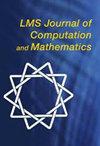计算6和7秩有限Chevalley群的Sylow -子群中的共轭类
Q1 Mathematics
引用次数: 15
摘要
设G(q)是一个有限Chevalley群,其中q是好素数p的幂,设U(q)是G(q)的一个慢p子群。然后,Higman猜想的一个推广版本断言,U(q)中共轭类的个数k(U(q))是由q中系数为整数的多项式给出的。在之前的一篇论文中,第一和第三作者开发了一种算法来计算k(U(q))的值。通过使用GAP将其实现到计算机程序中,他们能够计算k(U(q))对于秩不超过5的G,从而证明在这些情况下k(U(q))是由q中的多项式给出的。在本文中,我们提出了一些改进和改进算法,使我们能够计算k(U(q))对于秩为6和7的有限Chevalley群的值,除了E_7。我们观察到k(U(q))是一个多项式,因此广义Higman猜想对这些群成立。而且,如果我们把k(U(q))写成q-1的多项式,那么系数是非负的。在k(U(q))是q-1的多项式的假设下,我们也给出了k(U(q))在0、1和2度的系数的显式公式。本文章由计算机程序翻译,如有差异,请以英文原文为准。
Calculating conjugacy classes in Sylow -subgroups of finite Chevalley groups of rank six and seven
Let G(q) be a finite Chevalley group, where q is a power of a good prime p, and let U(q) be a Sylow p-subgroup of G(q). Then a generalized version of a conjecture of Higman asserts that the number k(U(q)) of conjugacy classes in U(q) is given by a polynomial in q with integer coefficients. In an earlier paper, the first and the third authors developed an algorithm to calculate the values of k(U(q)). By implementing it into a computer program using GAP, they were able to calculate k(U(q)) for G of rank at most 5, thereby proving that for these cases k(U(q)) is given by a polynomial in q. In this paper we present some refinements and improvements of the algorithm that allow us to calculate the values of k(U(q)) for finite Chevalley groups of rank six and seven, except E_7. We observe that k(U(q)) is a polynomial, so that the generalized Higman conjecture holds for these groups. Moreover, if we write k(U(q)) as a polynomial in q-1, then the coefficients are non-negative.
Under the assumption that k(U(q)) is a polynomial in q-1, we also give an explicit formula for the coefficients of k(U(q)) of degrees zero, one and two.
求助全文
通过发布文献求助,成功后即可免费获取论文全文。
去求助
来源期刊

Lms Journal of Computation and Mathematics
MATHEMATICS, APPLIED-MATHEMATICS
CiteScore
2.60
自引率
0.00%
发文量
0
审稿时长
>12 weeks
期刊介绍:
LMS Journal of Computation and Mathematics has ceased publication. Its final volume is Volume 20 (2017). LMS Journal of Computation and Mathematics is an electronic-only resource that comprises papers on the computational aspects of mathematics, mathematical aspects of computation, and papers in mathematics which benefit from having been published electronically. The journal is refereed to the same high standard as the established LMS journals, and carries a commitment from the LMS to keep it archived into the indefinite future. Access is free until further notice.
 求助内容:
求助内容: 应助结果提醒方式:
应助结果提醒方式:


